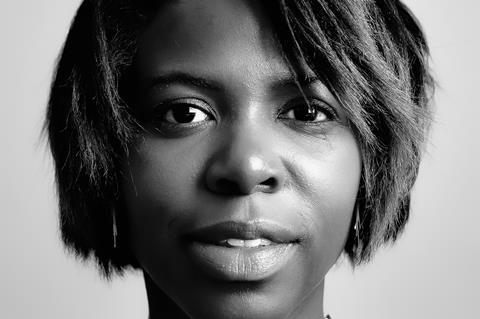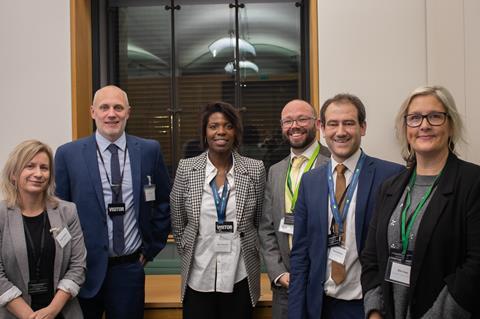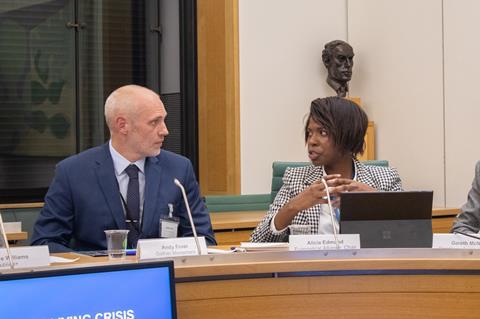Alicia Edmund is head of public policy at the Evangelical Alliance. She spoke with Jemimah Wright about her journey to faith and her passion for seeing God’s values outworked within the political arena and society at large

Tell us about your background – where you were born and brought up.
My mum was born in Trinidad and Tobago. She came to England in the 1970s when she was studying to be a nurse and midwife. I was born in 1986 and I would say my background is black British Caribbean. I own the phrase Essex Girl, because I was born and raised in Barking and still live in the county. I predominantly grew up in a white, working-class community. My last memory of seeing my father was probably when I was about four, but he was never involved in my life on a day-to-day basis. My mum had a 40-minute commute to work so I went to a childminder. She played a very prominent role in my life because I was with her early mornings, weekends and sometimes part of the school holidays.
I knew I was loved by my mum, but the idea of being loved by my father was very challenging to accept. God the Father wasn’t a concept I would talk about. To pray the Lord’s Prayer jarred emotionally, as I thought: “I’ve known an imperfect earthly father; how could God be a perfect heavenly Father?” In my mid-20s I went on a long journey of forgiveness, releasing all that hurt and disappointment that my dad didn’t know about my life or my interests. That opened the door for me to encounter the heavenly Father’s love personally.
When did faith become real for you?
My mum is a Christian and I went to a Church of England School and did confirmation classes. I walked away from God as a teenager, but friendship played a huge role in me coming back to faith, aged about 17. I had a friend in sixth form who was active in his church. He invited me along to a service. At that time, I was questioning what I believed. The teaching at his church challenged me, so I went on an Alpha course. I started off questioning everything, and then towards the end of the course I realised Jesus is who he says he is, and he loves me.
What did you do after school?
I went to the University of Essex to do a politics degree. My courses really broadened my horizon in terms of conversations about political systems around the world. I had people in my class from Turkey, Iraq, China, Palestine and the United States, and we engaged in conversations about political theory. They came to the subject from a completely different worldview than my own. While I was at university, faith wasn’t as prominent in my life.
Friendship played a huge role in me coming back to faith
It was only when I came out of university that I re-engaged my faith in a very proactive way. I went back to my old church, and was challenged again. About two years after graduation, I was invited onto the church leadership team. Stepping up into church leadership enabled me to take my faith more seriously and be more engaged proactively.

How did you come to be head of public policy at Evangelical Alliance?
I worked in secular spaces for ten years before coming to the Evangelical Alliance. My last job was with a youth charity, looking at the social outcomes for young people in care, prison, excluded from school or in communities where violent crime is high. It was very much a policy-influencing role looking at violence reduction units across the UK. But after a few years the environment got really challenging, particularly for me being a person of faith. A friend showed me the Evangelical Alliance had a vacancy for a public policy role. She sold it to me by saying: “It’s a combination of everything that you’ve worked on for the last ten years: it’s working in government; it’s working in policy influencing and it is speaking on behalf of the Church.” I was naturally hesitant because it meant having to leave the secular space. I had wanted to be a Christian working in the secular environment, bringing kingdom thinking to that space, but God had other plans.

It’s easy to be discouraged looking at politicians today. Do you have hope for British politics in particular?
Something that I’ve been coming back to, particularly in light of last year’s debacle of a revolving door of different prime ministers and the chaos that was happening in Westminster, is that we know our hope isn’t in politics. It’s in Christ. I’ve been reflecting more and more on the final two chapters of Revelation. They talk about the new heaven and new earth and the tree of life. When we’re confronted with difficult conversations, meetings with ministers haven’t gone well or the Twitter trolls come, I know how the story ends; I know that Jesus wins. One day my role will become redundant, because society will be redeemed and his kingdom will be perfect.
I’m encouraged that there are more Christian MPs across the political divide, who are speaking up for gospel truth and justice. In parliament, they’re stepping over the threshold and are willing to be counted as not just a Conservative, Labour or Liberal Democrat but as a Christian MP.
He has called us to articulate biblical values in a progressive culture
I’m also encouraged when at the same time that there has been opposition towards us, doors have opened to have meetings with ministers with a different viewpoint who are not Christian. The Lord is encouraging us that though the times are difficult and challenging, he is with us and he has called us to articulate biblical values in a progressive culture.
How can we be praying at this time for those in politics?
The theme of revival is very much at the forefront of my thinking. Habakkuk 3:2 says: “I’ve heard all about you, Lord. I’m filled with awe by your amazing works. In this time of our deep need, help us again as you did in years gone by. And in your anger, remember your mercy” (NLT).
I am convinced that we need the Lord’s mercy in this time, but it is also important to recognise that God’s goodness and justice are needed in our culture more than ever. So that’s my personal prayer. It’s one that I’m striving for in my own personal devotion, and in how I lead as head of public policy.
Alicia explains the Evangelical Alliance:
The Evangelical Alliance has existed since 1846, for the two purposes of unifying the UK Church in mission and equipping the evangelical voice to speak into every layer of society today. We’re a membership body, made up of individuals, churches and organisations. I would say that the core of our advocacy and its mission is to explain evangelical beliefs and convictions in a culture that is both secular and progressive. Often those convictions and beliefs are misunderstood, and so the nature of our team across the four nations is to articulate who the membership is, what the local church is doing in communities, and how they’re bringing transformation. It’s to both engage in public policy, which is the heavy lifting behind law, but also equip evangelicals to engage on those issues and the challenges that they face today.
For more information and for resources on how to engage the biblical narrative in everyday conversations go to eauk.org
































No comments yet